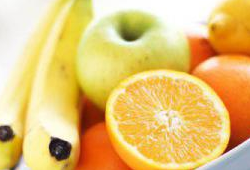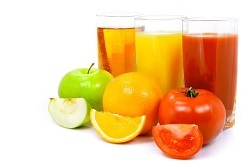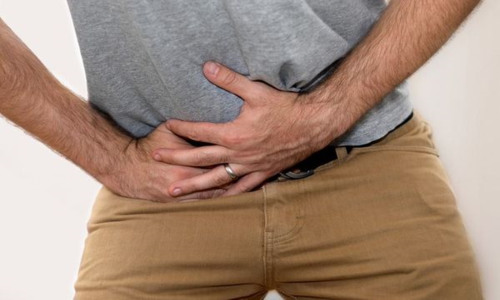Renal dysfunction refers to conditions characterized by the breakdown of all functions, which results in impaired electrolyte, water and nitrogen metabolism. The inability of the kidneys to perform their immediate functions is chronic or acute. In general, renal activity( hematopoietic and metabolic, ionoregulating and excretory) is dependent on materials intended for processing.

Entering into our body products can harm even absolutely healthy kidneys. And if kidney failure develops, the damage can turn out to be irreparable. Therefore, a diet with renal failure is the most important, decisive factor in the therapy of this pathology. Since the kidneys are no longer physiologically able to cope with the duties, the goal of dietary nutrition is to reduce the burden on the affected organs.
General information on renal insufficiency
Insufficiency is diagnosed when most nephrons( 90%) - functional renal units - lose their efficiency and the kidneys lose their functionality. Such renal pathology can develop for a number of specific reasons:
- A sharp drop in pressure( collapse);
- Shock of any etiology;
- Renal lesions due to autoimmune and inflammatory pathologies such as glomerulonephritis or pyelonephritis;
- Various nephropathic injuries;
- Acute intoxication of any etiology - drugs, poisons, etc.;
- Defeat or remove the only remaining kidney;
- Gestosis on a late date;
- Pathologies that cause disorders and disorders of the urethra;
- Tumor nephropathic pathologies.
The fundamental task of the kidneys is the blood purification from the substances rendered harmless by the liver, therefore, with the development of renal dysfunction, all metabolic products continue to move along the blood vessels of the body along with the bloodstream, penetrating even into the brain. As a result of toxic effects, patients begin to experience various disorders of consciousness from minor disorders to coma. Such patients often change their mood, jumping from depression to euphoria and back again. Appetite in patients is absent, and causeless vomiting provokes an increase in aversion to food. Patients suffer puffiness of a systemic nature, accruing in a matter of hours. They are accompanied by oliguric( 0.4 l urine per day) or anuric( 0.05 l urine) manifestations.
The body tries to compensate for kidney deficiency by removing excess fluid through the gastrointestinal cycle, which leads to frequent diarrhea.
For acute variety of the disease, sudden, lightning-fast development is characteristic, mainly due to poisoning( arsenic, mercury, fungi, medicines, etc.) or shock( surgical or burn, traumatic, etc.).The acute form can develop and against the background of pathological conditions and infections such as nephritis or pyelonephritis, etc. In the absence of care, the acute development of pathology can be fatal. Diet in acute renal failure is directed to prevent protein decay by correcting metabolic processes and shading the failed organs.
The chronic form of this disease is a pathological condition associated with the gradual development of renal dysfunction, up to its complete atrophy. The provoking factors of this pathological form are any conditions that cause glomerular lesions( vascular and rheumatic pathologies, substance-exchange and kidney pathologies).The most frequent causes of insufficiency are congenital renal anomalies, diabetes, pyelonephritis and glomerulonephritis of chronic form.
Principles of power supply
 Because the body accumulates metabolic protein products, poisoning the body, then dietotherapy is the most important. To begin with, patients need to significantly limit daily protein intake, according to the degree of deficiency, the proportion of proteins should be 25-70 g. Because the protein is used in limited quantities, it is extremely important for the patient to provide nutritional value by increasing the intake of carbohydrates and fats. It should be enough in the diet of fruit and vegetable dishes, and it is necessary to take into account the salt, vitamin and protein composition of foods. Patients are extremely important to limit the intake of water and salt in accordance with their condition( whether there are edemas, their intensity, the degree of insufficiency and the indices of blood pressure).Dishes need treatment that contributes to better appetite.
Because the body accumulates metabolic protein products, poisoning the body, then dietotherapy is the most important. To begin with, patients need to significantly limit daily protein intake, according to the degree of deficiency, the proportion of proteins should be 25-70 g. Because the protein is used in limited quantities, it is extremely important for the patient to provide nutritional value by increasing the intake of carbohydrates and fats. It should be enough in the diet of fruit and vegetable dishes, and it is necessary to take into account the salt, vitamin and protein composition of foods. Patients are extremely important to limit the intake of water and salt in accordance with their condition( whether there are edemas, their intensity, the degree of insufficiency and the indices of blood pressure).Dishes need treatment that contributes to better appetite.
At the initial stages of the pathology, the protein restriction is insignificant, it is recommended that patients consume it on the basis of protein grams per kilogram of weight. Proteins used in food must be of vegetable origin( vegetables and bread, legumes and nuts, cereals, etc.).The exchange products released by such proteins, affected kidneys are easier to remove from the body. In addition, in plant foods, many alkaline compounds are present, due to which acidosis is excluded( imbalance with acidity increase).
Sufficient energy nutritional value for patients should be achieved by eating carbohydrates and fats present in plant foods( fruits, nuts, vegetables, etc.).
Liquid should be consumed in quantities identical to those allocated, plus 0.5 liters. This is necessary to create a normal flow of metabolic processes and the uninterrupted withdrawal of their products. Salt restrictions are very small: when cooking dishes, salt is not put, but a day is allowed not more than 6 grams. In case of increasing urinary output, salt consumption is calculated as follows: 5 g of salt are taken per liter of urine. It is very useful to organize a weekly unloading day on potatoes, apples, pumpkins, watermelons.
 If the deficiency is clearly expressed, then the patient needs to reduce protein intake to 25-40 g. Most of the protein foods should be animal products like fish, meat, eggs or milk. In this variant, the nutritional value of the dietary intake should be increased by carbohydrates, plant and milk fats. In the dish it is allowed to add juices from sour fruit-vegetables( oranges, lemons, tomatoes, etc.), herbs and spices. The amount of liquid used should not exceed the daily amount of urine by more than 0.5 liters. Cooking should be based on cooking or steam cooking. The requirements for salt are limited to 3 g / day.
If the deficiency is clearly expressed, then the patient needs to reduce protein intake to 25-40 g. Most of the protein foods should be animal products like fish, meat, eggs or milk. In this variant, the nutritional value of the dietary intake should be increased by carbohydrates, plant and milk fats. In the dish it is allowed to add juices from sour fruit-vegetables( oranges, lemons, tomatoes, etc.), herbs and spices. The amount of liquid used should not exceed the daily amount of urine by more than 0.5 liters. Cooking should be based on cooking or steam cooking. The requirements for salt are limited to 3 g / day.
Preferred products of
The kidney is engaged in a very responsible activity - it removes slags, controls the water balance and the level of microelements. Therefore, in case of inadequacy, diet therapy is directed to minimization in the body of such substances with which the kidneys are no longer able to cope. This does not imply the absolute exclusion of such products, because the patient's body urgently needs a full-fledged diet, so the consumption of these substances is limited to a minimum.
Patients are strongly encouraged to eat cereal cereals, pasta dishes, milk, vegetable soups and juices, dairy or vegetable sauces, dill, spices, parsley, honey, herbal or green tea.
For example, a dietary diet with kidney failure involves the consumption of fats, except for poorly soluble( which include palm oil and sheep fat).It is necessary to enrich the diet with useful carbohydrates, which are contained mainly in cereals and dishes, of which cooked( casseroles, puddings, soups, cereals, etc.).The daily menu should be diverse, enriched with vegetables, berries, fruits, desserts. Vegetables are especially recommended for pumpkin and zucchini, leafy greens and cauliflower, carrots and potatoes. They are recommended to cook for a couple or boil, stew or cook lean soups. Of fruit and berry products make juices, mousses, compotes, etc.
Prohibited products
Since all the troubles in the event of deficiency carry protein degradation products, dietotherapy is based on the consumption of the minimum allowable amount of protein and foods rich in this element. The minimum allowable amount implies a restriction, and not the exclusion of protein products from the diet. And under the restriction of all proteins come, regardless of origin( animals, vegetable).By the way, it is recommended to restrict the vegetable protein in the first place. If the fluid is trapped in the body, this creates an additional burden on the kidneys, so it is recommended to cook food for kidney dysfunction without the addition of salt. Otherwise, the salt will provoke additional puffiness, increased pressure, etc.
For patients with kidney deficiency, use of foods like chocolate, ice cream, coffee, milk cream or cocoa is prohibited. You can not eat marinated and sour products, cheeses.
In addition, the kidneys purify the blood of phosphorus, which is usually present in protein foods, but sometimes there is also a meager protein diet. Consuming phosphorus-rich foods, the patient unnecessarily burdens the kidneys and harms the bone system, as an overabundance of phosphorus leads to the elution of calcium. This provokes the development of locomotor disorders. Often, the course of renal dysfunction is accompanied by a strong weakness, which is associated with an excessive content of potassium in the blood, the output of which is also disturbed against a background of insufficiency. Potassium overabundance provokes the development of muscle weakness, which carries a special threat to the myocardium, causing arrhythmias and cardiac arrest. Because of this, consumption of potassium-rich foods should also be limited. Among the most popular products, rich in potassium, bananas are allocated, so patients with kidney deficiency such fruits are generally recommended to be excluded from the dietary diet. Beans and wheat, avocados and nuts, dried fruits carry no less potassium danger, so they should be eaten with extreme caution.
The most common diet for patients with renal dysfunction is the specially designed Pevzner diet at number seven. It has specific separations in accordance with the type of insufficiency and its stages. In general, the seventh table is intended to facilitate the removal of metabolic products, helps reduce hypertensive symptoms and reduces renal loads.



